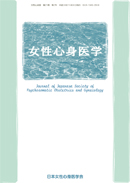Volume 25, Issue 1
Displaying 1-5 of 5 articles from this issue
- |<
- <
- 1
- >
- >|
-
2020Volume 25Issue 1 Pages 1
Published: 2020
Released on J-STAGE: July 02, 2020
Download PDF (138K)
-
2020Volume 25Issue 1 Pages 11-18
Published: 2020
Released on J-STAGE: July 02, 2020
Download PDF (477K)
-
2020Volume 25Issue 1 Pages 19-25
Published: 2020
Released on J-STAGE: July 02, 2020
Download PDF (541K) -
2020Volume 25Issue 1 Pages 26-33
Published: 2020
Released on J-STAGE: July 02, 2020
Download PDF (163K)
-
2020Volume 25Issue 1 Pages 34-39
Published: 2020
Released on J-STAGE: July 02, 2020
Download PDF (374K)
- |<
- <
- 1
- >
- >|
